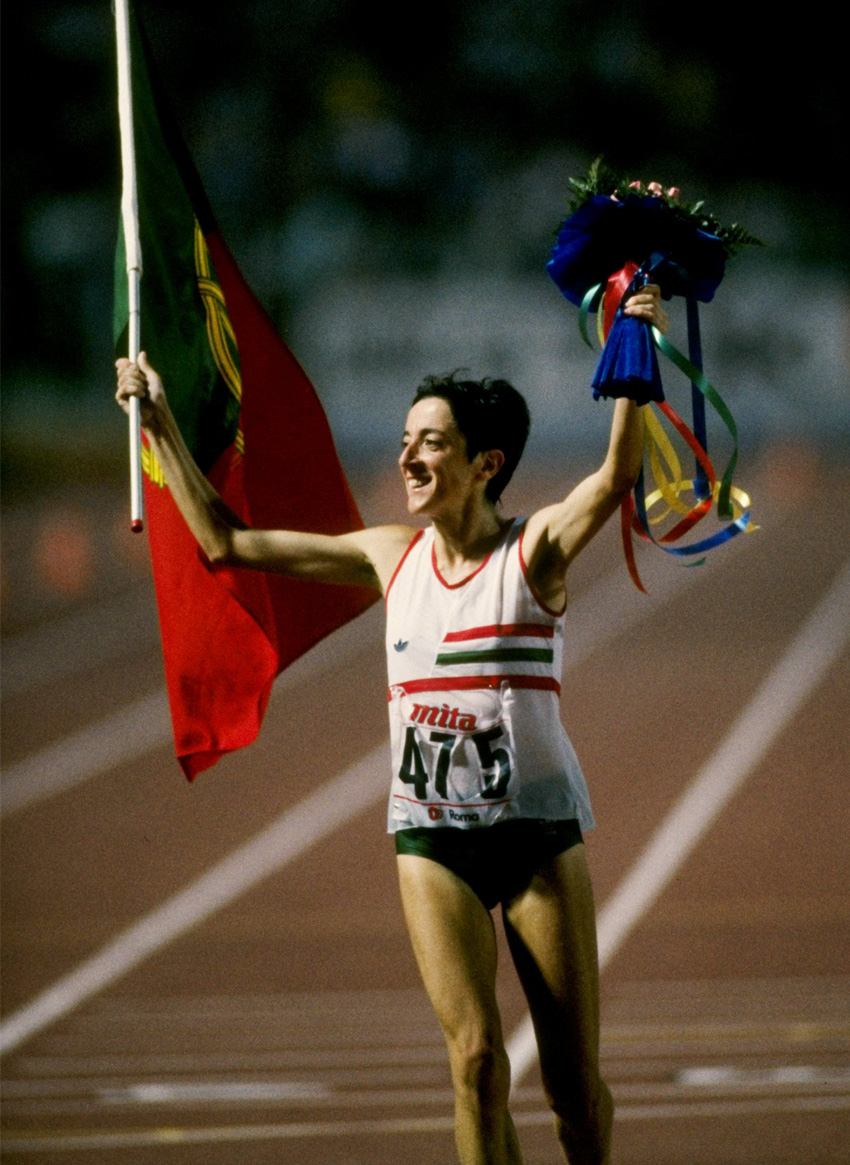Winners Never Quit
Nobody said it was easy being a woman. Fortunately, there are women who don't like easy things. A brief history of the women who have made sport a better place.
Like many other areas, sport has long been the exclusive domain of men. Its history is littered with unfortunate moments which, to this day, we see as misogynistic and embarrassing. You only have to go back to 1967, to the Boston Marathon, to find one of its saddest chapters — which, at the same time, marked a turning point in the way society views sports participation: on April 19 of that year, Kathy Switzer ran with the number 261 in one of the most important competitions in the United States. She did so under the pseudonym K. V. Switzer, since at the time marathons were closed to female participants. A journalism student, she was 20 years old and, she assured us after the incident, had “no desire to make political statements.” She just wanted to run. But four kilometers from the finish line, the organizers realized that there was an “intruder” and Switzer was surprised when another runner tried to throw her out, pushing her violently. “Get out of my race, give me those numbers!” shouted the man, who was promptly placated by Switzer's then-boyfriend, Tom Miller. She eventually managed to finish the race, and in 1972 the Boston Marathon officially began accepting women onto its roster. Inspired by her experience, Kathy Switzer made activism her mission, and in 2007 released a memoir called Marathon Woman.
While it's true that these incidents hurt the (magnificent) legacy of sport, whose spirit of respect and self-improvement inspires so many other disciplines, it's important not to forget that there are dozens of other events, full of glory, that remind us of the importance of high-level physical exercise. And it's not just about the success of a particular athlete, often a victory also means breaking down certain barriers and raising the bar for equality and social rights — in terms of race, ethnicity or gender, for example. This is particularly important at the Olympic Games (OG), a melting pot of diversity that unites the planet around a common good every four years. Here too, women had to fight, as they were only allowed to take part in the second edition of the Olympic Games, in Paris (1900), although not officially. “The Games are the solemn and periodic exaltation of men's sport, with the applause of women as a reward”, Pierre de Coubertin, the French historian who founded the modern Olympic Games, is said to have said. British tennis player Charlotte Cooper won the gold medal in women's singles tennis, becoming the first woman to win an Olympic singles title, and golfers Margaret Abbot and Pauline Whittier won medals in golf, but due to the lack of complete records, it is not known for sure which of the two was the first to win. In 1928, at the Olympic Games in Amsterdam, women officially took part. Like the Olympic Games, sport as a whole continues to make great strides towards fulfilling the dream of a (more) just society. Until then, we'll tell the story of the women who have made it happen. One medal at a time.
Rosa Mota
Often considered the best marathon runner of all time, Rosa Mota is one of the most important names in national athletics. Between 1982 and 1992 she ran 21 marathons and won 14. She is also the only person, since 2017, to hold the European, World and Olympic marathon titles simultaneously, which she achieved after winning the 1988 Olympic marathon. She ran her first marathon at the 1982 European Championships, and won. The following years he won bronze at the Olympic Games and in 1986 she defended her European title. She won gold at the 1987 World Championships and, at the 1988 Olympic Games, became the first Portuguese woman to win Olympic gold.
Kathy Switzer
On 19 April 1967, Kathy Switzer ran with the number 261 in one of the most important competitions in the United States, the Boston Marathon. She did so under the pseudonym K. V. Switzer, since, at the time, those competitions were closed to female participants. Miles from the finish line, the organisers became aware of his presence and one of them and one of them tried to push her out of the race. If it hadn't been for the protection of her then boyfriend, Switzer wouldn't have made it to the end. In 1972, the Boston Marathon officially began accepting female entrants.
Fanny Blankers-Koen
In 1999, Fanny Blankers-Koen was voted ‘athlete of the century’, largely for her four gold medals in the high jump at the 1948 London Olympics, according to the event's official website. At the time, she was 30 years old and had two children. And she could have won even more medals, had it not been for a rule limiting women to three individual events in athletics. At the time, she held the world records in the high jump and long jump. She set
16 world records in eight different events and won five European titles for the Netherlands between 1946-58.
Gertrude Ederle
She won a gold medal and two bronze medals in Paris (1924). In 1926, Gertrude Ederle became the first woman to swim the English Channel. In 14:34 hours, the American covered the 560 kilometres from one end to the other, paving the way for future female athletes in the discipline of long-distance swimming. It should be noted that Ederle also beat the five men who had completed the same challenge before her. It was no coincidence that she earned the nickname ‘queen of the waves.’ Her feat was only surpassed 24 years later.
Charlotte Cooper
The British tennis player was one of the first women to take part in the Olympic Games in Paris (1900). Charlotte Cooper was the first Olympic champion ever to win a gold medal in an individual event in the history of the modern Olympic Games. Before that, she had won three Wimbledon championships (in 1895, 1896 and 1898) and, after the Olympic Games, she won two more, in 1901 and 1908. Although she competed until the age of 50, it was her victory in 1900 that marked a turning point in the history of the Olympic Games, reinforcing the talent of women in competitive sport around the world.
Serena Williams
Tireless in her fight for equality, Serena Williams has never failed to show that she is also one of the greatest tennis players of all time. Throughout her career, she has won a total of 39 Grand Slam titles - 23 in singles, 14 in women's doubles and two in mixed doubles - making her one of the most important athletes of all time. She also has four Olympic gold medals, both in singles and doubles, won in Sydney 2000, Beijing 2008 and London 2012.
Billie Jean King
She is known as the woman who won the ‘Battle of the Sexes’, the most controversial tennis match ever, which took place on 20 September 1973 between Billie Jean King and Bobby Riggs. He, then 55 and with a history of tennis achievements, had a markedly macho attitude, and his public statements were aimed at provoking and denigrating women. Billie Jean King was not one for fashion and agreed to a ‘tit-for-tat’ match to see if they were really superior. The match was played live on television and King won, much to Riggs' humiliation.
Alice Coachman
She was the first African-American woman to win an Olympic gold medal, a victory that marked a historic moment in world sport. She did so at the 1948 London Games, after qualifying for the event by setting a world record - a jump of 1.68 metres. Alice Coachman won 25 national titles in the high jump (50m, 100m and 4 x 400m). At the 1948 Olympic Games, she was also the only American woman to win gold in athletics, making her a pioneer for future generations.
Maria Teresa de Filippis
At the age of 22, Maria Teresa de Filippis started racing because of a bet with two of her brothers. In a world of men, she managed to finish runner-up in the Italian championship and was hired by Maserati to race in the world's top motor racing category, Formula 1. At one of the races, in 1958, the race director said that ‘a young woman as beautiful as her shouldn't wear a helmet, except for a hairdryer at the hairdresser's’ and banned her from the sport. Maria's career ended a year later at the Circuit de Monaco, but two decades later she joined the International Club of Former Formula 1 Drivers, of which she became vice-president in 1997.
Nadia Comăneci
She is, without a doubt, one of the greatest gymnasts of all time. Nadia Comaneci won nine Olympic medals, five of which were gold. She was the first to achieve a perfect score of ten points in an artistic gymnastics competition - in Montreal in 1976, thanks to her performance on the uneven bars (asymmetric parallel bars). She was only 14 years old and was 1.5 metres tall. She set a new standard for the gymnasts who followed her and became one of the youngest medallists in the history of the Olympic Games.
Simone Biles
Simone Biles' story continues to unfold as this issue hits newstands. The American gymnast, now 27, changed the way we look at top-level athletes forever when she announced, at the height of her stardom, that she needed to rest to take care of her mental health. The winner of thirty world championship medals, twenty-three of them gold, she is the most decorated gymnast in the United States.
Most popular
.jpg)


Relacionados
.jpg)
Anna Wintour e o presidente da câmara de Milão, Giuseppe Sala, revelam a localização do Vogue World 2026
24 Feb 2026



O que lhe reservam os astros para a semana de 24 de fevereiro a 2 de março
24 Feb 2026



